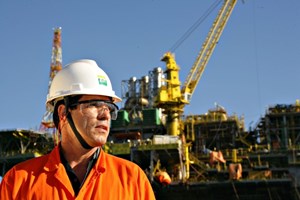Petrobras’ ambitious drilling plans offshore Brazil fuel rally in oil rig bonds
(Bloomberg) – Constellation Oil Services Holding SA’s bondholders are reaping a windfall due to increased demand for the company’s offshore rigs from Petroleo Brasileiro SA, a sharp recovery for a business that emerged from a debt restructuring less than two years ago.
While the group of holders is small, and liquidity is thin, notes due in 2026 have jumped roughly 25 cents since November 2022, handing investors a total return of around 45%, compared with an average of 16% for emerging-market corporates during that period, according to a Bloomberg gauge.
Constellation emerged from bankruptcy protection in Brazil in June 2022, almost four years after filing to restructure some $1.8 billion in debt. Now, with fresh capital from bondholders, less than $900 million in debt at the end of 2023 and its local fleet of seven rigs fully contracted, the company expects the day rates it charges for its equipment to rise thanks to strong demand, Chief Executive Officer Rodrigo Ribeiro said in an interview.
“Brazil is the best place in the world for offshore drilling operations,” he said. “A large portion of our contracts will be repriced in 2025, and that offers a huge upside.”
Petrobras expects to require 280 new wells through 2028, and refurbish or plug another 700 wells, it said in an emailed response to questions. The company said the market for day rates is dynamic and that it will review pricing when hiring new rigs. The state-owned company last year increased planned spending under its latest five-year plan by 31% to $102 billion.
Average rental prices for the newest, most advanced drill ships that can bore wells in waters more than two miles deep climbed 77% in the past 12 months to just under $500,000 a day in March, according to Evercore ISI. Ribeiro declined to disclose current day rates for Constellation’s fleet.
Turnaround. It’s a stark contrast from six years ago, when state-run Petrobras was cutting spending and debt in the aftermath of a corruption scandal. At the time, low oil prices hurt demand for drilling rigs and sent rental fees into a tailspin. Constellation, formerly known as QGOG, missed bond payments and began negotiating with creditors, a process that led many bondholders to take equity stakes in 2022.
Recent speculation about whether the government will replace the CEO of Petrobras hasn’t put Constellation’s investment plan in doubt. If anything, Brazil is keen to have the oil giant invest even more to help revive its naval industry and shore up growth.
Drilling companies “have been very busy here in Brazil, not only from investments by Petrobras, but also from juniors,” said Fabiana Gobbi, a credit analyst at S&P Global Ratings, in an interview. “The government has been very vocal that it wants Petrobras to keep going.”
Since the last oil downturn, the number of drilling rigs around the world has shrunk, as many older units were scrapped, and few providers are willing to spend $1 billion on deep-water rigs that take three years to construct, Ribeiro said.
The Valaris DS-17 Drillship Anchors For Maintenance Before Returning To Equinor's Offshore Oilfield
The Valaris DS-17 drillship anchored for maintenance in Guanabara Bay, off the coast of Niteroi, Rio de Janeiro state, Brazil, on Friday, June 9, 2023. Equinor ASA Brazil has awarded Valaris Ltd. a 540-day drilling contract scheduled to start in 2023 in its ultra-deepwater oil exploration fields. Photographer: Dado Galdieri/Bloomberg
Constellation has benefited from that, with earnings before interest, taxes, depreciation and amortization — a key measure of profitability — surging 176% in 2023 to $185 million. Ribeiro said he expects to nearly triple that in the coming two years before hitting $700 million in 2027.
Market leader. Constellation holds a 25% market share for offshore rigs in Brazil, and expects demand to keep growing. Between now and the end of the year, the company expects an additional five rigs to start operations, bringing the total count to 35, Ribeiro said.
Petrobras is adding 14 offshore production units between 2025 and 2028, and each of these vessels will need rig suppliers like Constellation to drill between 12 and 15 wells to extract oil from below the seabed.
“Petrobras’s schedule for FPSO contracts means guaranteed demand for drilling companies in Brazil,” Ribeiro said. “This gives comfort to investors in a company like ours, with such a large footprint in Brazil.”
Lead image: A drillship anchored in Guanabara Bay, off the coast of Niteroi, Rio de Janeiro state, Brazil. (Photographer: Dado Galdieri/Bloomberg)



